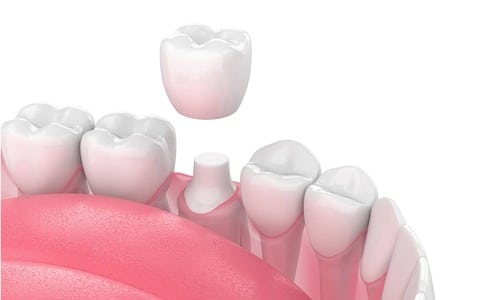How to Address Toothache Caused by Dental Crowns?
Is your crown tooth hurting? While a dental crown procedure helps cover and protect an affected tooth, it can sometimes cause toothache. There are many reasons behind this and thankfully many options are available for relief. This article focuses on the how to address toothache caused by dental crowns and ways to ease the crown causing tooth pain.
What Causes Dental Crown Pain?
There are many Toothache Caused by Dental Crowns. These are:
- Severe tooth decay under the dental crown– If oral hygiene is not maintained properly, over time, a new cavity can form at the tooth border and the dental crown, thereby causing intense pain in the long term.
- Serious infection- In case root canal therapy is not performed before placing of dental crown, the traumatised nerve can be pressurised by the dental crown and an infection could occur. The infection can even occur due to the spread of bacteria from old dental fillings underneath the dental crown. As the nerves get infected, severe dental crown pain is felt.
- Sore gums following crown placement- Such pain or discomfort associated with crown placement is usually short-lived.
- A fractured tooth or dental crown- A crack or fracture in a tooth or dental crown can expose the tooth nerves and increase the tooth’s sensitivity as well as cause mild toothache.
- Teeth grinding- Such bad oral habits can increase pressure on the dental crown and cause pain in the crowned tooth.
- Recessed gums- If the gums around the crowned tooth have receded and exposed the part of the tooth’s root due to plaque build-up or gum disease, it can lead to toothache.
- Improper fitting dental crown- If the dental crown is not placed right, the bite may be affected. This would cause tooth pain or discomfort.
How Long Does Dental Crown Pain Last?
How to address toothache caused by dental crowns: Typically, toothache following a dental crown placement continues to be felt by the patient for two weeks. If the pain is not subsiding, it’s worsening, or lingering beyond two weeks of having dental crowns placed, then it is suggested to promptly visit a dentist.
What are the Treatments Available to Get Relief from Dental Crown Pain?
In cases of dental crowns causing tooth pain, various treatment modalities can work to provide relief. The dentist may recommend a particular treatment, depending upon the specific cause and severity of the dental crown pain, the patient is experiencing. If the definite cause of toothache is yet to be identified, the dentist may ask the patient to try on simple, temporary pain relief options. These include:
- Pain-relief medications- There are some over-the-counter as well as prescription painkillers available to reduce pain or discomfort caused by crown placement.
- Salt water rinse- Rinsing the mouth with lukewarm saltwater may help reduce inflammation and pain caused by dental crowns.
- Steering clear of problematic foods- Avoiding the intake of hard, sticky, sugary, extremely hot, and cold foods and drinks can help reduce toothache, if these are the triggers.
- Home remedies- Certain natural herbs can provide relief from dental crown pain. These include turmeric, garlic, clove, ginger, and chamomile.
- Mouth guards or splint- In the case where the patient experiences dental crown pain because of teeth clenching or grinding, the dentist may give customized mouth guards or splints to the patient to get rid of toothache.
- Oil pulling or flossing- This works if the dental crown pain is due to the lodging of food.
In case of persistent or severe toothache caused by dental crown, the dentist may recommend either of the following treatments:
- Root Canal Therapy- This is done when the crowned tooth is severely infected and the dentist tries to save it. In this treatment, a root canal specialist drills a hole through the affected dental crown to get access to the infected pulp chamber. Next, the root canal specialist removes the infected tooth material.
With the help of special dental filling instruments, the pulp chamber along with the root canals are cleaned and shaped. The pulp chamber is irrigated constantly to prevent any debris from building up. Once done, disinfectant is used to avoid further infection, and the canal is sealed with rubbery material gutta-percha. A permanent filling of the canal is performed over it. Lastly, the tooth is topped off with a new dental crown.
- Crowned tooth extraction- Dental crowns are installed over damaged teeth, weak or worn-down teeth, or severely discolored teeth. If the teeth, they are trying to safeguard, can’t be saved with a root canal and capping, the dentist has no option but to pull out the tooth causing intense pain.
- Dental crown replacement- Some patients may fail to perform proper aftercare for existing dental crowns and thus suffer from prolonged dental crown pain. Some may experience cracked dental crown pain or pain caused by dental crown not fitting properly in the mouth. In such cases, the dentist replaces the dental crown with a new one.
How Can I Prevent Dental Crown Pain or Cracked Dental Crown Pain?
Dental crown pain can be avoided by becoming committed to practicing good oral hygiene. Every dental hygienist or dentist recommends brushing two times a day, daily flossing once, and regularly visiting a dentist for oral health check-ups and professional dental cleaning. In addition, the dentist recommends people steer clear of chewing on sugar-loaded, sticky, and hard items such as ice, as it can damage their dental crowns. Biting or chewing on hot and chilled food items must also be avoided. cracked dental crown pain can be corrected by replacing it with a new one with the help of a dentist.
The Takeaway to Address Toothache Caused by Dental Crowns
After receiving a dental crown, it is very likely that the patient will experience dental crown pain. However, the pain or discomfort resolves within a couple of weeks of the placement of the dental crown. There could be many reasons why the crown causing tooth pain, including cavities, infections, cracked dental crowns, or other oral health issues.
If you are experiencing persistent toothache after crown instalment, as soon as possible consult a dental professional, so that you can understand what is happening to you and get appropriately treated. You may require root canal therapy, tooth extraction, or a crown replacement. All of these dental services are available at First Point Dental Clinic at affordable prices.
Also Read:

